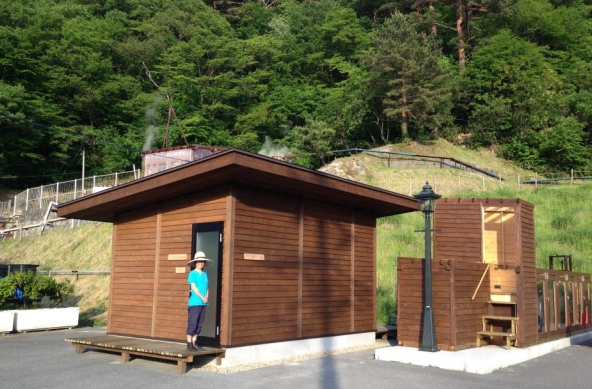
It’s often said that, rather than splashing out on expensive new appliances and fitting solar panels to our roofs, it’s the smaller changes we can make in our daily lives that will have an enormous positive effect on the environment. The act boiling a kettle, for example, may seem like a relatively harmless one, but – often because we boil more water than we actually use – we waste thousands of tons of carbon every single day simply by making cups of tea or coffee.
With that in mind, a new members-only cafe has recently opened its doors in the town of Osaki, Miyagi Prefecture, which uses energy from patrons’ kitchen waste to boil the water needed for a relaxing brew, making the green tea they serve some of the greenest in the world by far.
Situated in the parking area belonging to Naruko Onsen (hot springs), ene cafe METHANE is welcoming guests with bags of “nama gomi” (lit. “raw waste”), and in return giving them free cups of tea. The tiny little shop requires would-be patrons to become members first, but stresses that all are welcome and that they require only about as much kitchen waste as would fit in an everyday lunchbox to claim a free hot drink.
Using the biomass energy created from these waste products (which, don’t worry, is kept well away from the kitchen area!) the cafe is able to heat the water required to make hot drinks, with no additional gas or electricity required. Even better, the same kitchen scraps can be used to make liquid fertiliser for crops, meaning that the process is entirely cyclical: vegetables can be grown using the fertiliser, picked and eaten, then any husks, leaves, roots and the like can be turned into fertiliser to feed future crops of plants.
Sure, it’s only one little cafe, but very little helps, and we can’t help thinking that after a nice, relaxing dip in the onsen, a cup of hot, guilt-free tea would go down very nicely!
Cafe info
ene cafe METHANE
Naruko Onsen Yomogida 232-3, Osaki-shi, Miyagi Prefecture 989-6711
Press release (Japanese)
Source: Entabe, Tohoku University
Photo via Entabe

 Potama serves up epic rice balls like no other, and there’s only one store in Tokyo
Potama serves up epic rice balls like no other, and there’s only one store in Tokyo Drift ice in Japan is a disappearing winter miracle you need to see now
Drift ice in Japan is a disappearing winter miracle you need to see now Family Mart ups its convenience store food game with special burger from beef bowl chain Matsuya
Family Mart ups its convenience store food game with special burger from beef bowl chain Matsuya Japanese restaurant chain serves Dragon Ball donuts and Senzu Beans this spring
Japanese restaurant chain serves Dragon Ball donuts and Senzu Beans this spring Hey! You Can Drink Sweet Potatoes, says Japanese beverage maker with new drink
Hey! You Can Drink Sweet Potatoes, says Japanese beverage maker with new drink Potama serves up epic rice balls like no other, and there’s only one store in Tokyo
Potama serves up epic rice balls like no other, and there’s only one store in Tokyo Drift ice in Japan is a disappearing winter miracle you need to see now
Drift ice in Japan is a disappearing winter miracle you need to see now Family Mart ups its convenience store food game with special burger from beef bowl chain Matsuya
Family Mart ups its convenience store food game with special burger from beef bowl chain Matsuya Japanese restaurant chain serves Dragon Ball donuts and Senzu Beans this spring
Japanese restaurant chain serves Dragon Ball donuts and Senzu Beans this spring Hey! You Can Drink Sweet Potatoes, says Japanese beverage maker with new drink
Hey! You Can Drink Sweet Potatoes, says Japanese beverage maker with new drink Japan Extreme Budget Travel! A trip from Tokyo to Izumo for just 30,000 yen [Part 2]
Japan Extreme Budget Travel! A trip from Tokyo to Izumo for just 30,000 yen [Part 2] Yakuzen ramen restaurant in Tokyo is very different to a yakuza ramen restaurant
Yakuzen ramen restaurant in Tokyo is very different to a yakuza ramen restaurant Starbucks Japan releases first-ever Hinamatsuri Girls’ Day Frappuccino
Starbucks Japan releases first-ever Hinamatsuri Girls’ Day Frappuccino Saizeria meal hack by foreign diners introduces us to a secret dish that’s not on the menu
Saizeria meal hack by foreign diners introduces us to a secret dish that’s not on the menu Fully posable “Titan Eren” figure to debut next year, looks just as nude/terrifying as expected
Fully posable “Titan Eren” figure to debut next year, looks just as nude/terrifying as expected Highest Starbucks in Japan set to open this spring in the Tokyo sky
Highest Starbucks in Japan set to open this spring in the Tokyo sky Tokyo Skytree turns pink for the cherry blossom season
Tokyo Skytree turns pink for the cherry blossom season Japan Extreme Budget Travel! A trip from Tokyo to Izumo for just 30,000 yen [Part 1]
Japan Extreme Budget Travel! A trip from Tokyo to Izumo for just 30,000 yen [Part 1] Japan has only one airport named after a samurai, so let’s check out Kochi Ryoma【Photos】
Japan has only one airport named after a samurai, so let’s check out Kochi Ryoma【Photos】 Japanese drugstore sells onigiri at pre-stupid era prices, but how do they compare to 7-Eleven?
Japanese drugstore sells onigiri at pre-stupid era prices, but how do they compare to 7-Eleven? Burning through cash just to throw things away tops list of headaches when moving house in Japan
Burning through cash just to throw things away tops list of headaches when moving house in Japan Starbucks Japan releases new sakura goods and drinkware for cherry blossom season 2026
Starbucks Japan releases new sakura goods and drinkware for cherry blossom season 2026 Japan’s newest Shinkansen has no seats…or passengers [Video]
Japan’s newest Shinkansen has no seats…or passengers [Video] Foreigners accounting for over 80 percent of off-course skiers needing rescue in Japan’s Hokkaido
Foreigners accounting for over 80 percent of off-course skiers needing rescue in Japan’s Hokkaido Super-salty pizza sends six kids to the hospital in Japan, linguistics blamed
Super-salty pizza sends six kids to the hospital in Japan, linguistics blamed Starbucks Japan unveils new sakura Frappuccino for cherry blossom season 2026
Starbucks Japan unveils new sakura Frappuccino for cherry blossom season 2026 Foreign tourists in Japan will get free Shinkansen tickets to promote regional tourism
Foreign tourists in Japan will get free Shinkansen tickets to promote regional tourism The 10 most annoying things foreign tourists do on Japanese trains, according to locals
The 10 most annoying things foreign tourists do on Japanese trains, according to locals Take a trip to Japan’s Dododo Land, the most irritating place on Earth
Take a trip to Japan’s Dododo Land, the most irritating place on Earth Naruto and Converse team up for new line of shinobi sneakers[Photos]
Naruto and Converse team up for new line of shinobi sneakers[Photos] Is China’s don’t-go-to-Japan warning affecting the lines at a popular Tokyo gyukatsu restaurant?
Is China’s don’t-go-to-Japan warning affecting the lines at a popular Tokyo gyukatsu restaurant? Survey asks foreign tourists what bothered them in Japan, more than half gave same answer
Survey asks foreign tourists what bothered them in Japan, more than half gave same answer Japan’s human washing machines will go on sale to general public, demos to be held in Tokyo
Japan’s human washing machines will go on sale to general public, demos to be held in Tokyo Starbucks Japan releases new drinkware and goods for Valentine’s Day
Starbucks Japan releases new drinkware and goods for Valentine’s Day We deeply regret going into this tunnel on our walk in the mountains of Japan
We deeply regret going into this tunnel on our walk in the mountains of Japan Studio Ghibli releases Kodama forest spirits from Princess Mononoke to light up your home
Studio Ghibli releases Kodama forest spirits from Princess Mononoke to light up your home Major Japanese hotel chain says reservations via overseas booking sites may not be valid
Major Japanese hotel chain says reservations via overseas booking sites may not be valid Put sesame oil in your coffee? Japanese maker says it’s the best way to start your day【Taste test】
Put sesame oil in your coffee? Japanese maker says it’s the best way to start your day【Taste test】 No more using real katana for tourism activities, Japan’s National Police Agency says
No more using real katana for tourism activities, Japan’s National Police Agency says Japan Extreme Budget Travel! A trip from Tokyo to Izumo for just 30,000 yen [Part 2]
Japan Extreme Budget Travel! A trip from Tokyo to Izumo for just 30,000 yen [Part 2] Yakuzen ramen restaurant in Tokyo is very different to a yakuza ramen restaurant
Yakuzen ramen restaurant in Tokyo is very different to a yakuza ramen restaurant Starbucks Japan releases first-ever Hinamatsuri Girls’ Day Frappuccino
Starbucks Japan releases first-ever Hinamatsuri Girls’ Day Frappuccino Saizeria meal hack by foreign diners introduces us to a secret dish that’s not on the menu
Saizeria meal hack by foreign diners introduces us to a secret dish that’s not on the menu Fully posable “Titan Eren” figure to debut next year, looks just as nude/terrifying as expected
Fully posable “Titan Eren” figure to debut next year, looks just as nude/terrifying as expected Eight surprising things to do in Northern Okinawa
Eight surprising things to do in Northern Okinawa Japan’s Naruto theme park now offering real-world version of Minato’s kunai ninja weapon
Japan’s Naruto theme park now offering real-world version of Minato’s kunai ninja weapon How to make curry in a rice cooker with zero prep work and no water[Recipe]
How to make curry in a rice cooker with zero prep work and no water[Recipe] Retired pro wrestler Riki Choshu greets you at the door in this new line of sound gachapon toys
Retired pro wrestler Riki Choshu greets you at the door in this new line of sound gachapon toys Snacking in Singapore — A Japanese visitor’s list of some favorite Singaporean snacks
Snacking in Singapore — A Japanese visitor’s list of some favorite Singaporean snacks Japanese former adult video actress’ documentary promises to show her giving birth in live stream
Japanese former adult video actress’ documentary promises to show her giving birth in live stream Foreign tourists on Shinkansen bullet train break suitcase etiquette, angering local passengers
Foreign tourists on Shinkansen bullet train break suitcase etiquette, angering local passengers Japan’s new fashion brand for large-breasted women smashes crowdfunding goal
Japan’s new fashion brand for large-breasted women smashes crowdfunding goal W.T.F. Japan: Top 5 crazy things about Japanese supermarkets 【Weird Top Five】
W.T.F. Japan: Top 5 crazy things about Japanese supermarkets 【Weird Top Five】